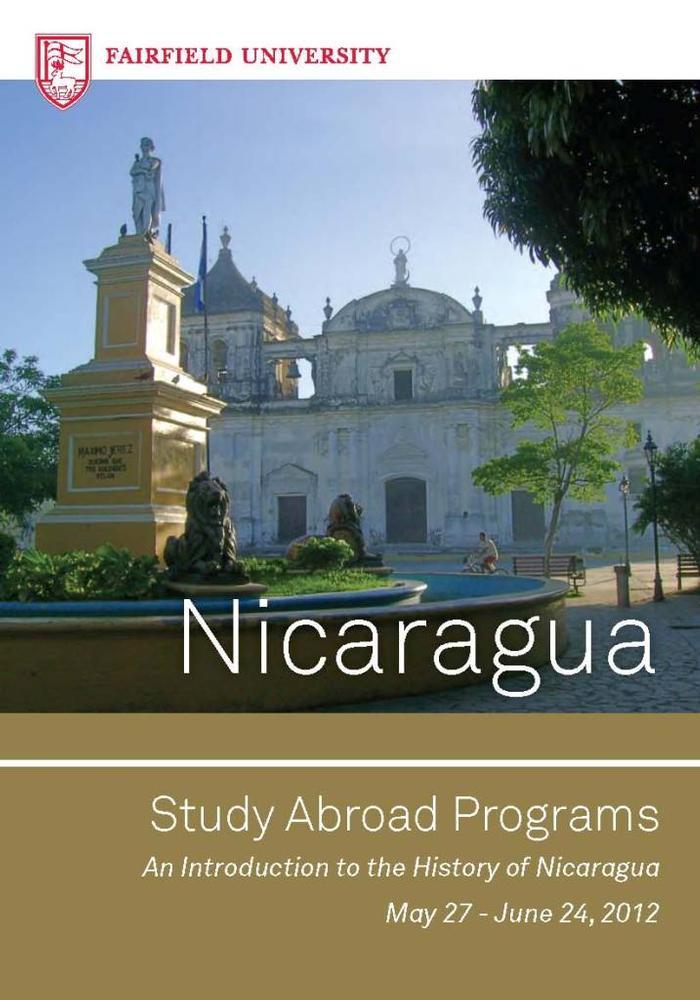
AN INTRODUCTION TO NICARAGUAN HISTORY
This program offers two courses (six credits total) during a four week session in Nicaragua. It will be offered to students in Summer 2012.
Nicaragua is a country of contrasts, where exquisite natural beauty serves as backdrop for this nation's fascinating history. It is the and of lakes and volcanoes, of colonial architecture and modern high-rises, of both rich and poor. Nicaragua is the perfect place to learn, live, and experience the realities of the developing world.
Known for its colorful culture, the land inhabited by the native Nahuatl was settled by the Spanish in the 16th-century. After independence in 1834, the country has witnessed both natural and man-made disasters, while contributing some of the best poets and artists in the Spanish-speaking world. Nicaragua finds itself at the crossroads between north and south, between yesterday and today.
This course provides an introduction to the history of Nicaragua with a focus on the national period. The program takes place through the Universidad Centroamericana, Nicaragua (UCA). Students will study the formation of the Nicaraguan nation state during the first century after its independence from Spain, focusing on the problems derived from local rivalries as well as British and U.S. interest in controlling Nicaragua's transoceanic route.
Students will examine aspects of the social history and economic development of Nicaragua, including the study of land, labor and production systems, gender relations and ethnicity.
Finally, the course will analyze the main themes that have shaped the history of Nicaragua since the early twentieth century: the paradoxes of U.S. intervention; the historical meaning of Sandino's revolutionary nationalist struggle; characteristics of the Somozas' dictatorship; and political, social and cultural aspects of the Sandinist Revolution.
HIGHLIGHTS
Week I: The emergence of Nicaragua
(1789-1858)
Specific objectives: To understand the problems faced by the emerging Nicaraguan state, derived from local rivalries as well as British and U.S. interest in controlling Nicaragua's transoceanic route.
Week II: Nation Building, Ethnicity, and Gender
Specific Objectives: To understand the relationship between state formation, ethnicity, and gender in the Nicaraguan society, especially its impact on Indian communities.
Week III: U. S. Intervention and revolutionary nationalism
Specific objectives: To obtain a general knowledge the paradoxes of U.S. governments' efforts to export democracy via military intervention.
To analyze the popular nationalistic resistance movement led by Sandino against the U.S. intervention;its local impact and the international solidarity it inspired.
Week IV: Dictatorship and Revolution
Specific objectives: To understand the characteristics of the Somoza regime and how it promoted economic growth at the cost of social inequity, political corruption and military repression.
APPLICATION DEADLINE:
March 1, 2012
Program deposit of $500 due with application.
Balance due April 1, 2012
A cumulative GPA of 2.8 is required.
PROGRAM
Tuition: $3,995 includes:
- Six Fairfield University undergraduatecredits
- Housing to be be provided by a Nicaraguan host family and hotels where appropriate
- Orientation course
- All meals included
- Welcome dinner
- Site visits to historical places, including:
Granada
León
Niquinohomo and White Towns
Managua
Masaya and Monimbó
Matagalpa: Indigenous Community
"El Chile"
San Carlos and the San Juan River
Solentiname Archipelago
Greytown
- Transportation to historical places and airport will be provided
Airfare is not included.
The Trustees of the University reserve the right to change tuition rates and make additional changes whenever necessary.
